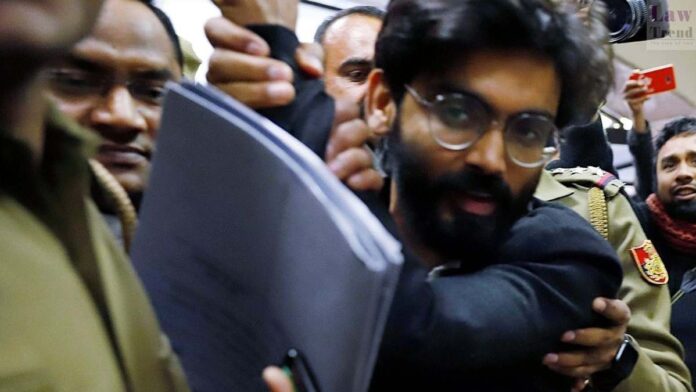The Delhi High Court, on Thursday, refused to stay a city court’s order that framed charges against Sharjeel Imam, a former scholar at Jawaharlal Nehru University, linked to the 2019 Jamia violence. The violence followed the contentious passage of the Citizenship Amendment Act (CAA) in December 2019, which sparked widespread protests across Jamia Millia Islamia and Shaheen Bagh.
Sharjeel Imam, arrested in January 2020, faces allegations of inciting communal tensions during the anti-CAA protests. He has consistently denied these charges, attributing them to misinterpretations of edited video clips. The charges against him include serious offenses under various sections of the Indian Penal Code (IPC), such as abetment of an offense, criminal conspiracy, promoting enmity between different groups, and unlawful assembly and rioting, among others. He is also charged under the Prevention of Damage to Public Property Act.
During the proceedings, Justice Sanjeev Narula of the Delhi High Court heard Imam’s plea, represented by advocate Ahmad Ibrahim, which sought a stay on the city court’s decision made on March 7. Imam’s legal team argued that the decision was passed without proper consideration and that the matter was due for another hearing on April 23. However, Justice Narula decided against staying the order pending a response from the Delhi Police, which is due by the next hearing on April 24.
The city court, in its March 7 ruling, characterized Imam as not just a participant but a “kingpin” in a broader conspiracy to provoke violence during the protests. The court cited Imam’s speeches, which it described as “venomous” and divisive, purportedly aiming to stir unrest between religious communities and disrupt public order through unlawful means.
Additional sessions judge Vishal Singh of Saket Court noted that Imam’s speeches across various locations in December 2019, including Munirka, Nizamuddin, Shaheen Bagh, and Jamia Nagar, were crafted to incite the minority community against the CAA and the National Register of Citizens (NRC).
In his defense, Imam’s petition, also advocated by Talib Mustafa, challenged the legal basis of the city court’s order. It argued that the order failed to substantiate the criteria under section 153A of the IPC, which deals with promoting enmity between different groups. Imam’s defense contends that his call for Muslim unity in his speeches does not equate to inciting conflict between religious groups.




